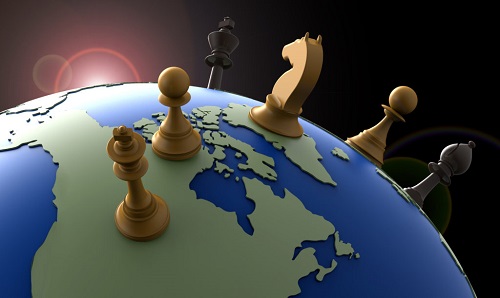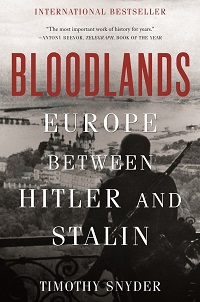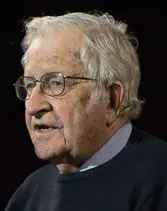|
TRANSLATE THIS ARTICLE
Integral World: Exploring Theories of Everything
An independent forum for a critical discussion of the integral philosophy of Ken Wilber
  Frank Visser, graduated as a psychologist of culture and religion, founded IntegralWorld in 1997. He worked as production manager for various publishing houses and as service manager for various internet companies and lives in Amsterdam. Books: Ken Wilber: Thought as Passion (SUNY, 2003), and The Corona Conspiracy: Combatting Disinformation about the Coronavirus (Kindle, 2020). Frank Visser, graduated as a psychologist of culture and religion, founded IntegralWorld in 1997. He worked as production manager for various publishing houses and as service manager for various internet companies and lives in Amsterdam. Books: Ken Wilber: Thought as Passion (SUNY, 2003), and The Corona Conspiracy: Combatting Disinformation about the Coronavirus (Kindle, 2020). Part 6 | Part 7 | Part 8 | Part 9 | Part 10  Subjugation or
|
| Gorodnichenko et al. | Chomsky's response |
|---|---|
| 1. Denying Ukraine's sovereign integrity | "I meant Crimea is not an issue at this moment." |
| 2. Treating Ukraine as an American pawn on a geo-political chessboard | "I neither stated nor 'insinuated' anything of the sort." |
| 3. Suggesting that Russia was threatened by NATO | "I never suggested that. That's why you can't find a citation." |
| 4. Stating that the U.S. isn't any better than Russia | "That is more gross misrepresentation." |
| 5. Whitewashing Putin's goals for invading Ukraine | "You give no citations, for the simple reason that there are none." |
| 6. Assuming that Putin is interested in a diplomatic solution | "What you find 'preposterous' is well-documented historical fact." |
| 7. Advocating that yielding to Russian demands is the way to avert the nuclear war | "Since I have never advocated 'yielding to Russian demands' I need not respond at all. " |
I do find Chomsky's response a bit mystifying, to say the least. But his main point is that rejecting a settlement by negotiation will expose Ukraine to "a ghastly experiment" that might very well end in a huge number of casualties.
Feldman concludes on an inclusive but pessimistic note:
One has to consider many factors in this war: Ukrainian sovereignty, Russian militarist aggression, local regional preferences in areas once controlled by Ukraine, U.S. and NATO militarist expansion, the requirements of diplomacy, the risks of escalation, etc. By focusing solely on the first two factors, one can develop all kinds of indicators and arguments which beg the question about the other factors. Even if we were to assume that Putin is presently disinclined to negotiate (or negotiates in bad faith), what will Ukraine and Zelensky do after the United States decides to stop paying billions to keep the war going, growing tired of the costs of its militaristic solidarity?
Reply to Dillard and Meyerhoff
Where does that leave me as a concerned citizen, who lacks the expertise to say anything worthwhile in matters of geopolitics, self-determination, war and peace? At least I can try to formulate a response to the essay(s) by Dillard and Meyerhoff, who strongly have argued in favor of the realist position when it comes to world politics.
Joseph Dillard, to my taste, has completely identified with Putin's perspective, to the extent that not only does he see Ukraine as a Nazism-infected country, but that we, as Europeans who support Ukraine, share the same label and should also be denazified (opinions he ventillates on Facebook). This ties in with his overall conviction that we, as Westerners, support dubious dictatorial regimes, including that of the US, and therefore our level moral development cannot be other than substandard.

Given Ukraine's traumatic history of the past century (it is part of what historian of Eastern Europe Timothy Snyder has called "bloodlands"[4]), in which it got squashed between both communism (Stalin) and Nazism (Hitler), but but also got trampled on by practically all of its neighbouring countries, none of which took the Ukrainians seriously and used them as an exploitable agrarian labor force, I can understand why its fragile and recent nationalism takes the forms as it does in Ukraine. When Russia is your enemy, I can't think of more motivated soldiers than Neo-Nazis (even if their ideology is obviously objectionable). But generalizing from several paramilitary batallions to all of the Ukrainian government, to all of Ukrainians as "passive Nazis", and ultimately to all Europeans as "Nazi supporters"—that's is painting the picture of history with too broad a brush, and an ugly one at that.
The whole "denazification" narrative crafted by Putin is, in my opinion, just a thinly disguised excuse to hide his agenda to restore Russia's greatness. And in his imperialist mind, a "Sacred Greater Russia" cannot be restored without Ukraine, Russia's historic land of origin.[5] While I can "follow" this historical reasoning, it simply is no longer part of the 21st century to live in terms of past empires, given the problems our own century poses (global warming being at the top of the list, with Russian weak economy largely thriving on fossil fuels). Putin is as obsessed with Nazism as Neo-Nazis are obsessed with Russia. It is time to let these World War II metaphors die out.
As to Jeff Meyerhoff, who frames this whole topic in the context of global warming, he doesn't touch on this denazification part of Putin's agenda. Chomsky being his long time hero, he obviously agrees with his analysis of the current situation. In his opinion, we can only solve the climate crisis (and the Ukraine crisis, for that matter) if we internationally cooperate within a multi-polar world, in which no single superpower dictates the rules of the game. Obviously, both Russia and China can appreciate and actually actively promote such a view of the world. This is a broad discussion best left for another essay.
As to the Ukraine conflict, he mentions that NATO expansion wasn't the only way to guarantee the safety of former communist countries in Eastern Europe, but I doubt if agreements and treatises can be held up when tensions rise and relationships deteriorate. Yes, a larger NATO is definitely something the US welcomes, all the more so if these countries practically queue up to join. But should that not tell us something? They no longer want to belong to Russia's sphere of influence. The message they give to Russia is: we don't want you anymore—let alone invade you.
When it comes to defending the realist position (even if in a "leftist" variant), Meyerhoff rather lazily lists some "experts" from that camp, who supposedly had predicted the current issues, and can explain the current situation better. But should we really succumb so easily to the "might makes right" philosophy of realism? I haven't reached a conclusion about this myself but will definitely take his arguments into account. But quite atypical for Meyerhoff, he hasn't confronted these realists with their mainstream critics, as I have done briefly in this essay.
THE DEBATE ABOUT REALISM
On May 12th a fabulous debate was staged between two well known realists (American political scientists John Mearsheimer and Stephen Walt) and two liberals (American diplomat and academic Michael McFaul, a former US ambassador in Russia, and Polish politician and journalist Radoslaw Sikorski) in Toronto, Canada.
Both the realist and the "non-realist" positions are defended forcefully and passionately. The common ground between these opponents is that they deplore the war in Ukraine and look for ways to end it—about how to reach this goal they differ considerably. The resolution that was debated was formulated as follows:

A pre-debate poll was held among the audience, as well as a post-debate poll. At the start of the debate, a small majority voted in favor of the resolution, after the debate the voting changed considerably in favor of the No.
| VOTES | PRO | CON |
| PRE | 53% | 47% |
| POST | 38% | 62% |
As just one example of the arguments raised by anti-realists: to the standard question, "what if Canada asked for military assistance from China, would the United States allow that? Of course not", the counter argument would be: what motive would Canada ever have for such a move, if it wasn't because the US threatened to invade it? After all, Canada borders on the US and Canadians and Americans speak the same language (to paraphrase Putin's argument about Ukraine)... To which Walt half-seriously comments: we tried that once, in 1812, and the White House got burned down, so that didn't work out. Now we love our Canadian neighbors.
Perhaps one might conclude that "acknowledging Russia's security concerns" is a good place to start, but a bad place to end our investigation.
NOTES
[1] See recent Integral World essays listed on this overview page.
[2] See for example: Nathan J. Robinson, "Noam Chomsky on How To Prevent World War III", www.currentaffaris.org, 13 April 2022 and Jeremy Scahill, "Noam Chomsky, Jeremy Scahill on the Russia-Ukraine War", theintercept.com, April 14 2022.
[3] Yuriy Gorodnichenko, "Open Letter to Noam Chomsky (and other like-minded intellectuals) on the Russia-Ukraine war", blogs.berkeley.edu, May 19, 2022.
[3a] Noam Chomsky, "The Ukraine War: Chomsky Responds", Counterpunch, June 3, 2022.
[3b] Jonathan M. Feldman, "A Response to Yuriy Gorodnichenko, Bohdan Kukharskyy, Anastassia Fedyk and Ilona Sologoub Regarding Their Critique of Noam Chomsky on the Russia-Ukraine War", Counterpunch, June 3, 2022.
[4] Timothy Snyder, Bloodlands: Europe Between Hitler and Stalin, Basic Books, 2010.
[5] Frank Visser, "Putin's Dark Ideology of a Sacred Greater Russia", www.integralworld.net, April 2022.
[6] Timofey Sergeytsev, "Что Россия должна сделать с Украиной" [What should Russia do with Ukraine?], ria.ru, April 3, 2022 (English translation by Nataliya Popovych, ccl.org.ua, April 4, 2022). See: Wikipedia:
"What Russia should do with Ukraine" (Russian: Что Россия должна сделать с Украиной, Chto Rossiya dolzhna sdelat' s Ukrainoy), is an op-ed article written by Timofey Sergeytsev [uk] and published by the Russian state-owned news agency RIA Novosti. The article calls for the full destruction of Ukraine as a state and the Ukrainian national identity.
According to Der Tagesspiegel, Sergeitsev supports the pro-Putin political party "Civic Platform" financed by one of the oligarchs from Putin's inner circle. According to Euractiv, Sergeitsev is "one of the ideologists of modern Russian fascism".
See also this comment from Timothy Snyder, "Russia's genocide handbook", snyder.substack.com, April 8, 2022. From which:
The genocide handbook explains that the Russian policy of "denazification" is not directed against Nazis in the sense that the word is normally used. The handbook grants, with no hesitation, that there is no evidence that Nazism, as generally understood, is important in Ukraine. It operates within the special Russian definition of "Nazi": a Nazi is a Ukrainian who refuses to admit being a Russian.
The Russian handbook is one of the most openly genocidal documents I have ever seen. It calls for the liquidation of the Ukrainian state, and for abolition of any organization that has any association with Ukraine.

